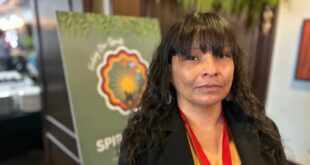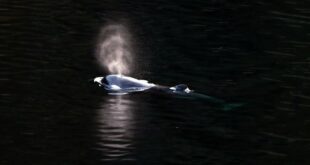‘No choice but to continue,’ says organizer about incident that left 2 hospitalized

About 10 boats left a foggy Kangiqsualujjuaq on July 25 as part of a three-day journey in what was bound to be an eventful trip.
A team from the Inuit community located along the northeastern side of Ungava Bay joined representatives from the Avataq Cultural Institute, a Nunavik organization dedicated to preserving language and culture.
They equipped their motor boats and canoes with the necessities: food, camping gear and supplies. But their most precious cargo was the bones of four unknown people whose remains were excavated from Killiniq island — in Nunavut — decades ago.
The team set off to rebury the repatriated remains that had been dug up by an archeologist in the 1930s for research. They had been housed for years in the Canadian Museum of History in Gatineau, Que.
Rhoda Kokiapik, executive director at the Avataq Cultural Institute, heard about the remains last year.
After months of work with museum staff — who eventually agreed to cover the cost of the repatriation process — Kokiapik finally picked up the bones in April and got to work planning the trip.
"It's unnatural for human remains to be stored in an institution," said Kokiapik. "It's very important that these remains or any other remains are properly put in place."
But the trip didn't go as smoothly as they had hoped.
In the early hours of the morning of July 26, Maggie Emudluk, mayor of Kangiqsualujjuaq, was home in bed when she was awoken by a frantic call.
A resident from town told her a polar bear had attacked two people 140 kilometres northeast of them on the first night of the trip and she needed to co-ordinate a rescue mission.
"The person, pretty much in a panic state, said 'The people that are going to Killiniq have been attacked by polar bears' …[I thought] 'Oh my God,'" said Emudluk.
"It was a father with his daughter and son."
Elder and daughter attacked by polar bear on 1st night out
Emudluk identified the three family members who were involved in the bear attack as elder Kenny Assevak and his adult children, daughter Siqua Baron and son Ned Baron — who had joined the expedition because of their roots in Killiniq.
The night of the incident, the family was sleeping in a tent when the polar bear showed up just after 2 a.m. Emudluk says the young polar bear reached the father first and then attacked the daughter before Ned Baron killed the bear with a gun at close range.
Emudluk says the father and daughter were seriously injured and are recovering but Ned Baron was not hurt.
Emudluk says the community reacted quickly.
"We dispatched the boat at 4:00 a.m. It's a couple of hours to go down and we were able to get these people back in our community around … 9:00 a.m. in the morning," said Emudluk.
She says the clinic airlifted the father and daughter — who both had serious cuts — to the hospital in Kuujjuaq, in Nunavik, Que. She says the elder was later taken to Montreal for treatment and is still recovering.
"It's a wild country out there. It's a beautiful but extremely hazardous environment," said Emudluk, adding that the rest of the repatriation crew had to continue on.
"They had to finish what they're trying to do."
LISTEN | Polar bear injures 2 people travelling to bring Inuit remains home:

A team from Nunavik faced a number of challenges trying to bury the repatriated remains of four people this summer. Among them, a polar bear attack. CBC's Rachel Watts spoke with the mayor of Kangiqsualujjuaq about the attack that happened on the first night of the journey.
Team forged on
Kokiapik, who was travelling ahead of the family with another group because of the thick fog, only heard the news over radio the next morning.
It was not how the team wanted the trip to start.
"[I thought] 'Oh boy, oh boy, I hope everyone is okay," recalled Kokiapik.
"We learned that they were rescued," she said. "So that was a bit of an assurance for us … We had no choice but to continue. We were very, very, very far."
The trip to the island took about seven hours by boat and when they finally arrived, Kokiapik says they got to work planning a proper burial.
This was Kokiapik's first time on the island, which she says used to be inhabited by Inuit who were nomadic.
When the government of the Northwest Territories shut down the community on the island in the 1970s, residents were dispersed to several communities. Kokiapik says while some people return to the island regularly, others haven't had the opportunity.
"People were happy," said Kokiapik. "I know some were happy to finally go to their childhood place."
Kokiapik says the team gathered rocks and found a spot to bury the remains near the water — a proper end to the trip that had been over a year in the making.
"It was such a surreal moment opening the box, which was wrapped in special material that will dissolve overtime," said Kokiapik.
"After that, we said a short prayer performed by one of our elders … Every human deserves to be resting."
ABOUT THE AUTHOR
CBC journalist
Rachel Watts is a journalist with CBC News in Quebec City. Originally from Montreal, she enjoys covering stories in the province of Quebec. You can reach her at rachel.watts@cbc.ca.
*****
Credit belongs to : www.cbc.ca
 MaharlikaNews | Canada Leading Online Filipino Newspaper Portal The No. 1 most engaged information website for Filipino – Canadian in Canada. MaharlikaNews.com received almost a quarter a million visitors in 2020.
MaharlikaNews | Canada Leading Online Filipino Newspaper Portal The No. 1 most engaged information website for Filipino – Canadian in Canada. MaharlikaNews.com received almost a quarter a million visitors in 2020.







